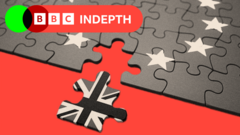The recent meeting at Lancaster House set the stage for emerging UK-EU diplomatic relations, raising questions about security pacts, trade agreements, and immigration policies. Political perspectives vary across the spectrum, revealing deep divisions over the UK's future relationship with Europe as Prime Minister Keir Starmer proposes new partnerships amid fears of a "sellout" and debates surrounding compliance with European regulations.
The UK's Diplomatic Reassessment: Signs of Reconciliation with the EU?

The UK's Diplomatic Reassessment: Signs of Reconciliation with the EU?
As discussions unfold over a potential UK-EU summit, tensions rise around the implications of closer ties and new partnerships post-Brexit.
On a pleasant morning earlier this month, a group of Metropolitan Police diplomatic protection officers relaxed off the grand entrance hall of Lancaster House in London, while European politicians discussed the future of cooperation within the continent. This historic location bore witness to the intertwined history of the UK and Europe, with interpretations of its architectural grandeur echoing significant past diplomatic encounters.
Key topics broached in the discussions, hosted by Foreign Secretary David Lammy, ranged from the ongoing war in Ukraine to efforts for increased cooperation with the European Union (EU). At the heart of the event was the announcement of a UK-EU summit, slated for May 19—the first since the UK’s departure from the bloc. The government, under Labour leadership, perceives this as a critical juncture, moving towards a promise of improved relations conditional upon UK election results.
In the pre-Brexit era, UK prime ministers frequently traveled to Brussels for high-stakes discussions. However, these summits ceased after the referendum, until the recent Labour initiative aimed at re-establishing new dialogues with European leaders. The upcoming summit, characterized in various lights by political factions, raises questions over its potential to foster "surrender" or to usher in a new pragmatic approach to governance.
A notable proposition is the revival of a UK-EU security pact initially proposed during Brexit discussions but set aside as the UK prioritized distancing from Brussels. EU foreign policy chief Kaja Kallas indicated the necessity for cooperation moving forward. However, opposition figures, such as Conservative frontbencher Alex Burghart, urge for exclusive reliance on NATO for defense, expressing skepticism toward a new partnership.
Industry leaders anticipate that a security agreement could economically benefit sectors in the UK. For example, substantial funds aimed at defense proposals under the EU's SAFE program could bolster British defense capabilities. Yet concerns linger over whether such an arrangement significantly alters the UK's geopolitical positioning or if it merely reaffirms existing cooperative frameworks established post-invasion of Ukraine.
In a related fiscal development, the prospect of a "veterinary" deal to ease border checks on food products is sparking debate among political leaders and industry stakeholders. While some argue that reduced regulatory burdens could benefit businesses like Creative Nature, which struggle with post-Brexit trade barriers, others warn of potential compromises on sovereignty through alignments with EU regulatory systems. Critics label this a “surrender summit,” portraying it as a retreat from the Brexit mandate to regain control over Britain's laws and borders.
Political arguments extend into territory concerning fishing rights, where upcoming negotiations may prove contentious. British fishermen's previous grievances underline the complexities faced in negotiations, raising the question of how to leverage fishing agreements in broader cooperative talks.
A new youth mobility scheme, initially termed an unfeasible prospect, may reflect a changing political climate as discussions about controlled work and residency for individuals under 30 gain traction. Some argue this would not significantly strain net migration figures but could ideally foster stronger ties with European youth.
In summary, the political landscape around the UK's potential realignment with the EU grows increasingly complicated. Opinions vary widely, with some viewing the summit as a chance to mend fences and foster pivotal partnerships, while others fear the loss of hard-won autonomy. As conversations at Lancaster House concluded, the future remains uncertain, teetering between the ambitions for collaboration and the preservation of independence.























